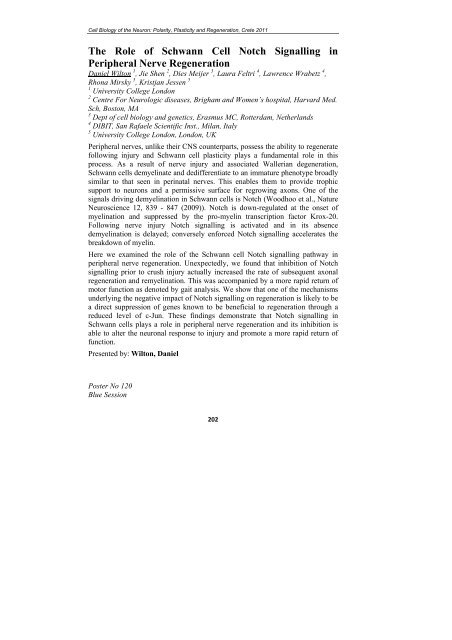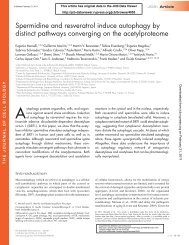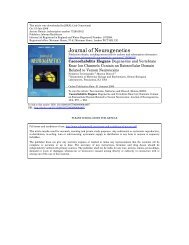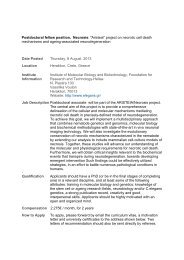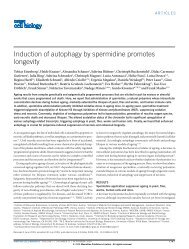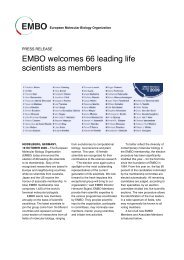CELL BIOLOGY OF THE NEURON Polarity ... - Tavernarakis Lab
CELL BIOLOGY OF THE NEURON Polarity ... - Tavernarakis Lab
CELL BIOLOGY OF THE NEURON Polarity ... - Tavernarakis Lab
Create successful ePaper yourself
Turn your PDF publications into a flip-book with our unique Google optimized e-Paper software.
Cell Biology of the Neuron: <strong>Polarity</strong>, Plasticity and Regeneration, Crete 2011<br />
The Role of Schwann Cell Notch Signalling in<br />
Peripheral Nerve Regeneration<br />
Daniel Wilton 1 , Jie Shen 2 , Dies Meijer 3 , Laura Feltri 4 , Lawrence Wrabetz 4 ,<br />
Rhona Mirsky 5 , Kristjan Jessen 5<br />
1<br />
University College London<br />
2<br />
Centre For Neurologic diseases, Brigham and Women’s hospital, Harvard Med.<br />
Sch, Boston, MA<br />
3<br />
Dept of cell biology and genetics, Erasmus MC, Rotterdam, Netherlands<br />
4<br />
DIBIT, San Rafaele Scientific Inst., Milan, Italy<br />
5<br />
University College London, London, UK<br />
Peripheral nerves, unlike their CNS counterparts, possess the ability to regenerate<br />
following injury and Schwann cell plasticity plays a fundamental role in this<br />
process. As a result of nerve injury and associated Wallerian degeneration,<br />
Schwann cells demyelinate and dedifferentiate to an immature phenotype broadly<br />
similar to that seen in perinatal nerves. This enables them to provide trophic<br />
support to neurons and a permissive surface for regrowing axons. One of the<br />
signals driving demyelination in Schwann cells is Notch (Woodhoo et al., Nature<br />
Neuroscience 12, 839 - 847 (2009)). Notch is down-regulated at the onset of<br />
myelination and suppressed by the pro-myelin transcription factor Krox-20.<br />
Following nerve injury Notch signalling is activated and in its absence<br />
demyelination is delayed; conversely enforced Notch signalling accelerates the<br />
breakdown of myelin.<br />
Here we examined the role of the Schwann cell Notch signalling pathway in<br />
peripheral nerve regeneration. Unexpectedly, we found that inhibition of Notch<br />
signalling prior to crush injury actually increased the rate of subsequent axonal<br />
regeneration and remyelination. This was accompanied by a more rapid return of<br />
motor function as denoted by gait analysis. We show that one of the mechanisms<br />
underlying the negative impact of Notch signalling on regeneration is likely to be<br />
a direct suppression of genes known to be beneficial to regeneration through a<br />
reduced level of c-Jun. These findings demonstrate that Notch signalling in<br />
Schwann cells plays a role in peripheral nerve regeneration and its inhibition is<br />
able to alter the neuronal response to injury and promote a more rapid return of<br />
function.<br />
Presented by: Wilton, Daniel<br />
Poster No 120<br />
Blue Session<br />
202


